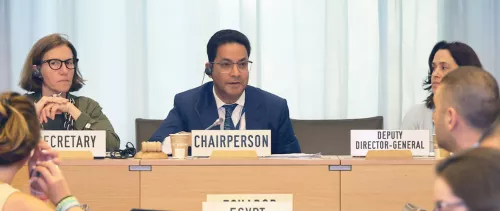
E-commerce co-convenors set out roadmap for concluding negotiations in early 2024
At the final round of e-commerce negotiations for 2023, taking place from 27 to 30 November, the co-convenors of the talks — Australia, Japan and Singapore — drew up a roadmap for negotiations for the remainder of the year and the first quarter of 2024. Participants “parked” the negotiating text on privacy, bringing the total number of “parked” articles to 13. The co-convenors said the initiative has achieved “substantial conclusion” on several global digital trade rules that will facilitate electronic transactions and foster an open and trusted digital economy.
Ambassador Tan said: “These rules will deliver tangible benefits to members, businesses and consumers. They will enable the growth of the digital economy and more importantly demonstrate that WTO members are committed to addressing emerging issues like digital trade and ensuring that the WTO remains relevant in the 21st century.”
Ambassador Tan added: “I would venture to say that the progress that we have achieved in the initiative on e-commerce is something that we can all be proud of. But we should not rest on our laurels.”
The co-convenors urged participants to come prepared in January 2024 to make progress on other important cross-cutting issues, such as the scope, exceptions and legal architecture of the future agreement.
Ambassador Tan continued: “This will pave the way for us to conclude negotiations early next year so that the initiative on e-commerce can start delivering concrete benefits.”
With the aim of concluding the negotiations in early 2024, the co-convenors said that the remaining weeks of this year will be focussed on bridging the gaps on outstanding issues, such as e-payments, telecommunications and information and communication technology products that use cryptography. The co-convenors urged participants to step up engagement with more intersessional meetings and informal consultations in the coming weeks.
Ambassador George Mina said: “We really are at a pivotal time for this initiative and what we have learned in the last few weeks through consultations is that we have within our grasp the opportunity to move this initiative into an agreement and there’s strong momentum behind us.”
Ambassador Mina added: “To do that, we’ll need to make a couple of key transitions. We will help this transition through providing you with the chair’s text that will strike visionary articulation of what’s possible now in this agreement.”
Ambassador Mina noted that it is time to balance ambition and inclusion but also prioritize pragmatism.
Ambassador Kazuyuki Yamazaki (Japan), co-convenor of the initiative, noted the importance of provisions on customs duties on electronic transmissions as one of the articles of commercial value of the agreement for business and commercial activity. He noted that provisions on development embodies inclusivity and is another critical component of the negotiations. Ambassador Yamazaki emphasized: “These two provisions will have crucial influence on whether the e-commerce initiative in which currently 90 members participate would be successful.”
Ambassador Yamazaki added: “We have duly taken note that many members believe that a number of challenging but important proposals including data flows, and localization and source code would require substantially more time for discussions as divergent approaches and sensitivities remain. Therefore, the co-conveners propose to further discuss these outstanding issues at the next stage and focus on finalizing the most promising issues now, as we have seen a similar “stages” approach in the previous negotiations.”
The co-convenors will share a “Chair’s text” capturing the initial package of outcomes and provide guidance on the next stages in the negotiations. Another negotiation round will be scheduled at the end of January 2024 to discuss this text.


